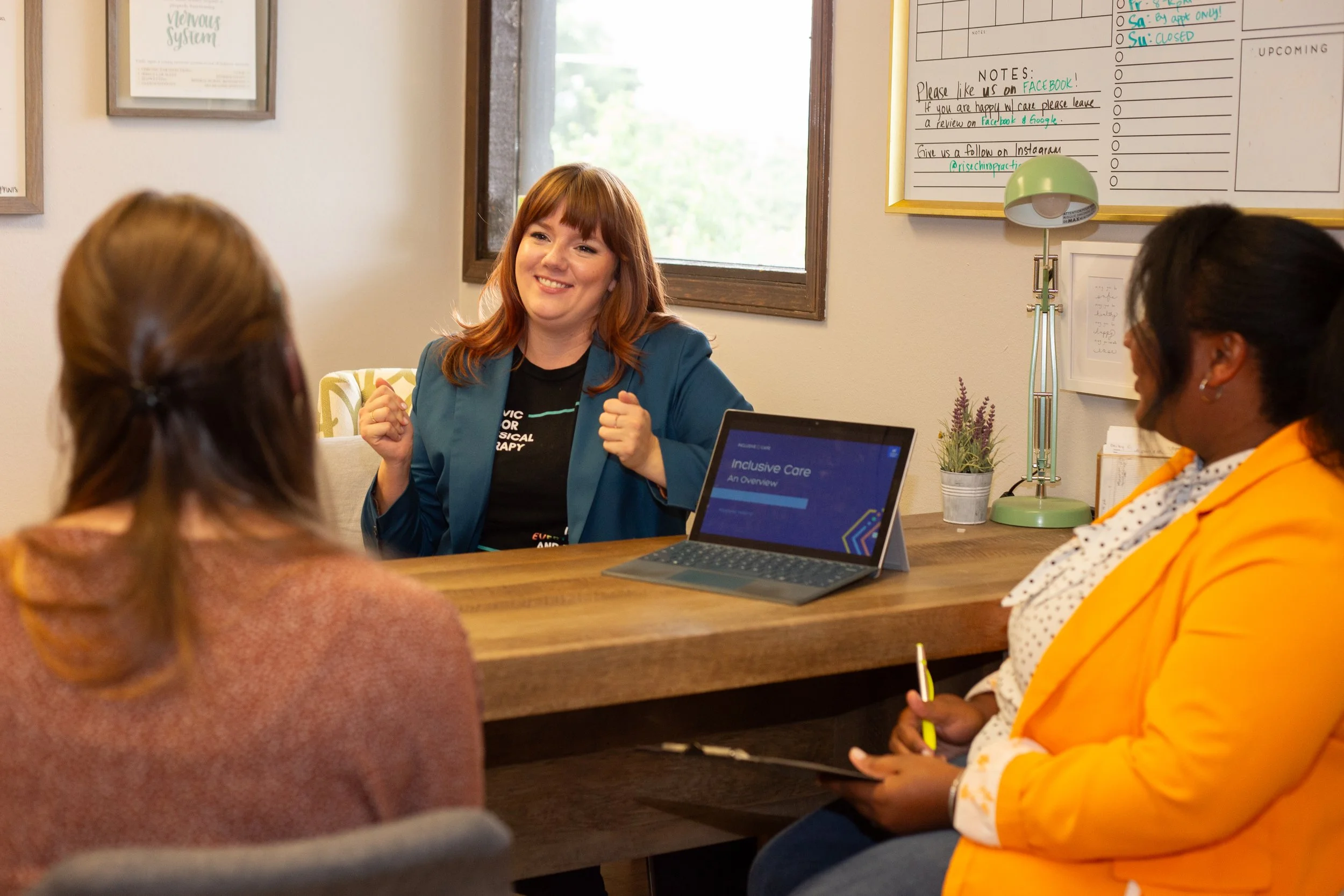Trauma-informed Care, Inclusive & Affirming
Referrals and Healthcare Education
Trauma informed care isn’t simply the way we provide the intervention, it often is the intervention itself
At Inclusive Care, we believe in the power of collaboration and are committed to forming strong partnerships with providers who share our goal of improving the quality of life for our patients.
We understand that a holistic approach to healthcare is essential, and we are here to complement your treatments by addressing the unique needs of patients struggling with pelvic floor issues.
Dr. Krystyna Holland, DPT, founder of Inclusive Care, is a specialized pelvic floor physical therapist dedicated to providing comprehensive and compassionate care to individuals experiencing chronic pain, particularly pelvic, abdominal, and low back pain, dyspareunia, vaginismus, endometriosis, vulvodynia, individuals experiencing urinary and fecal incontinence, pelvic organ prolapse, pregnancy related pain, and transgender individuals undergoing gender affirming care.
DO YOU HAVE PATIENTS STRUGGLING WITH PAIN DURING SEX?
The Playbook for Painless Sex
is expert advice you can trust and recommend!
Written and illustrated by Dr. Krystyna Holland, Inclusive Care’s Founder, 64 pages of inclusive, gender neutral, evidence based guidance on symptom specific strategies to improve your sexual experience.
Now Offering:
SoLá Cold Laser Therapy for Pelvic Pain Management
Persistent or chronic pelvic pain is notoriously difficult to treat, and many of its treatments, like medicine or surgery, have possibly significant side effects. SoLá Pelvic Therapy offers a non-invasive and non-pharmaceutical option for impacting the physiology of the pelvic region, creating pain relief.
95% of patients achieve maximal pain relief after 9 visits over approximately 5 weeks.
Trauma-informed Healthcare Inclusivity Training & Consulting
For Healthcare and Wellness Providers and Businesses
Training from Inclusive Care centers the humanity of both the patient and the provider, rather than providing band aid solutions for problems created by the system.
As people, we intuitively understand the need for affirming and trauma informed practices. As providers, we never learned what those are. These training sessions are not for soft skills - they are for tangible practices that increase patient safety and satisfaction in your medical practice.
Common Training Topics:
Separating Genitals and Gender:
Affirming Language and Communication in Pelvic Healthcare
Trauma Informed Principles in Practice: Development of a Trauma Informed Exam Flow
Trauma Informed Care isn’t Just for Patients: TIC Practices for Patients, Learners, and Ourselves
FAQs
-
Dr. Krystyna Holland, DPT is a “what is the least number of things I can do to get to the result I’m looking for” kind of gal. Based on your patient’s symptoms, your patient’s values, and your patient’s previous experience, we identify interventions that are likely to be big needle movers, and start with those. The part of pelvic floor physical therapy that takes the longest is figuring out what each patient’s specific body and nervous system need in order to reduce your symptoms. Once we figure that out, we typically space out visits in order to give patients time to work on those things at home, using the Inclusive Care accountability software to help them stay on track.
-
Yes! One hour mentorship sessions are available for instruction on trauma informed care and caring for transgender patients. Reach out to Krystyna@InclusiveCareLLC.com to inquire more.
-
-
Dr. Krystyna Holland, DPT is currently an investigator on several research studies regarding what makes a trauma informed care practice.
She has experience in treating patients in a federally qualified health center where the majority of patients utilized medicaid for their services. These patients included: refugees, transgender individuals undergoing gender affirming care, non-English speakers from around the globe, women who experienced female genital cutting, domestic violence survivors, sex workers, and survivors of sexual violence.
She is currently enrolled in coursework for the Trauma-Sensitive Heartmath Certification.
-
Trauma informed care practices are not “soft skills”. You can be the gentlest, kindest provider and not utilize trauma informed practices. You can also be aloof and impersonal and be a trauma informed care rockstar. Trauma informed care is taught through a series of clinical skills that are belief system and politically agnostic.
-
Yes! One of the parts of trauma informed care practices that is challenging is the unfortunate rarity with which they are practiced. Because trauma informed care is not the norm in America, it can be intimidating to practice in the way you intuitively know is right. These trainings give you language and references for validating the way you provide care.






